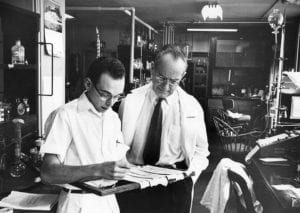Earl Smith
Chicago, Illinois, United States

Irvine Page was a physician scientist who discovered angiotensin and serotonin and proposed the multifactorial etiology of hypertension. He was a prolific medical writer and was instrumental in establishing what is now the National Academy of Medicine.
Dr. Page initially intended to become a chemist. Following his graduation from Cornell he took a job with Elliot Joslin for a year and worked on insulin. He then enrolled in Cornell Medical College where he found that he enjoyed working in the biochemistry lab along with clinical medicine. After graduation he completed a two year internship at Presbyterian Hospital, New York, and decided he wanted to become a brain chemist. He was offered a research position at a psychiatric hospital in Munich, Germany, and spent three years there doing studies in neurochemistry. He spent two months in Frankfurt with Vollhardt and worked on renin and other undetermined substances in the blood of patients with malignant hypertension. In 1931 he returned to the United States and took up a position at the Rockefeller Institute under Donald Van Slyke and continued to study substances in the blood that controlled blood pressure.
In 1937 Dr. Page moved to Indianapolis along with his associate Arthur Corcoran and in 1940 they demonstrated that renin was an enzyme that caused a “renin activator” to produce a pressor that they named angiotensin. (Simultaneously Braun-Menendez in Argentina also delineated this reaction and named the substance hypertensin. Page and Braun-Menendez then agreed to name this new substance angiotensin.)
In 1945 Dr. Page moved to the Cleveland Clinic to establish a new research department with an emphasis on hypertension. He continued his work on the renin-angiotensin system but believed there were also many other factors that contributed to the development of elevated blood pressure. In 1948 he reported on the discovery of another substance in the blood that affected blood pressure and named it serotonin. He crystallized this substance and in further studies demonstrated that it had vasopressor properties and was also important in neurotransmission. During his twenty years at the Cleveland Clinic his group made many contributions to the factors that influence blood pressure and demonstrated contrary to popular belief that high blood pressure did not result from one abnormality but was the result of many interacting factors—hormonal, neurological, vascular, and salt—the mosaic theory of hypertension. During this period he also studied the effects of various drugs used in the management of hypertension. He did many studies on hydralazine and was responsible for the development of sodium nitroprusside for use in the treatment of malignant hypertension and the use of angiotensin as a vasoconstrictor.
In the 1960s Dr. Page felt the National Academy of Science did not properly address medical issues. In 1967 he received a grant from the Cleveland Clinic and he convened a group of representatives from various academic medical groups in Cleveland to push for the establishment of a separate National Academy of Medicine. Although at that time they were unsuccessful in persuading the federal government to establish an academy, they did lay the groundwork for what is now the National Academy of Medicine.
In 1966 Dr. Page retired from the Cleveland Clinic and moved to Cape Cod where he had spent his childhood summers. Although he was no longer engaged in research he continued to write about hypertension and heart disease as well as serving as editor of Modern Medicine Magazine, a publication sent to US physicians that was a commentary on contemporary issues related to the practice of medicine.
Dr. Page was born in 1901 in Indianapolis, where his father was a prominent physician, and lived there until he left for college. He enjoyed music and he was always listening to classical music. His wife was an accomplished ballerina and his sister, Ruth Page, was the grand dame of dance in Chicago. He died in 1991 after being incapacitated for several months following an auto accident.
Today we would consider Dr. Irving Page one of the pioneers in the field on what is now called translational medicine.
EARL C. SMITH received his doctor of medicine degree from the University of Pittsburgh and completed a residency in internal medicine and a fellowship in nephrology at the Cleveland Clinic. He recently retired as Chief of Nephrology and Professor of Medicine at Rosalind Franklin University/The Chicago Medical School and Chief of Nephrology at Mount Sinai Hospital, Chicago. He is currently Chairman of the Board of the Hektoen Institute of Medicine.

Leave a Reply